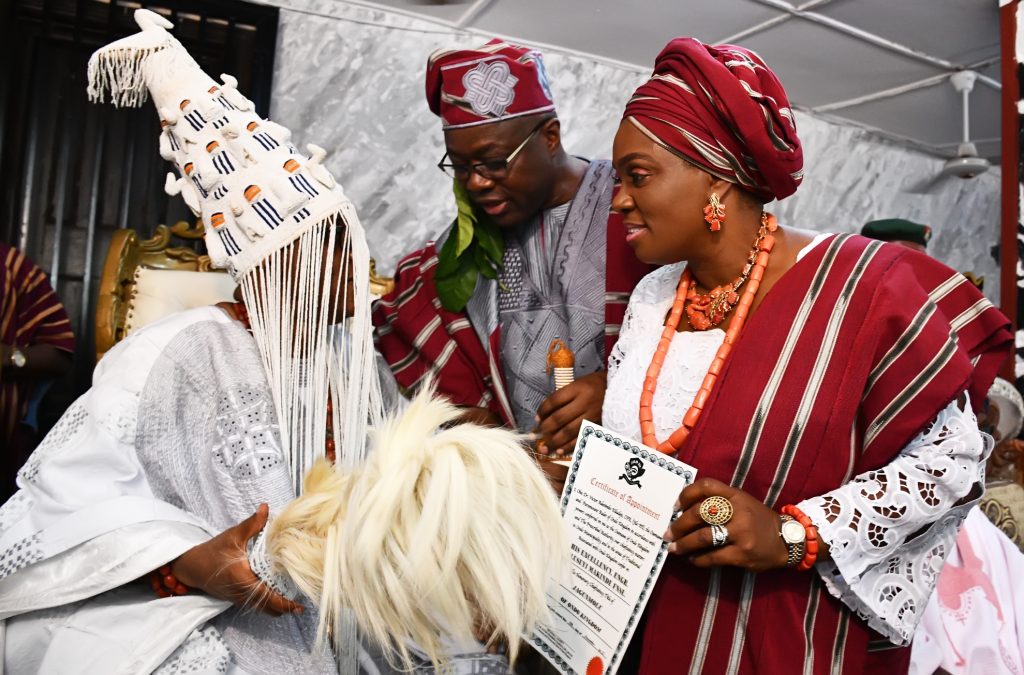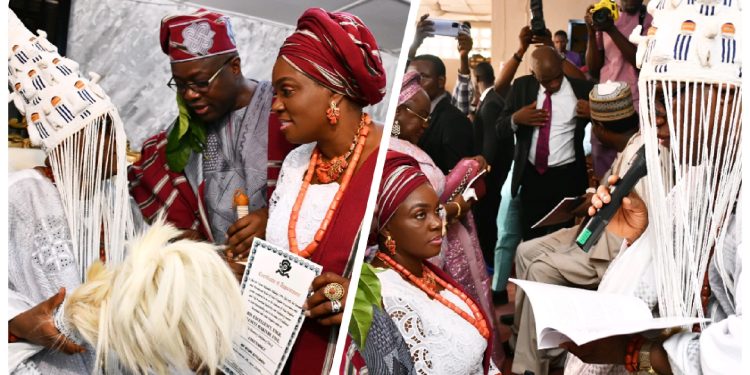•We must integrate traditional institution into governance for greater socioeconomic devt – Makinde
Oyo State governor, ‘Seyi Makinde, has declared that the traditional institution remains important to the socioeconomic development of the country, pointing out that Obas should be integrated into all efforts by states to develop the society.
Governor Makinde stated this on Friday, while delivering the guest lecture entitled “the role of traditional institutions in socioeconomic development in Nigeria,” during the 70th birthday anniversary and 17th Coronation Anniversary of Oba Dr Victor Adesimbo Kiladejo, CFR, held at the Oba Adesanoye Civic Centre, Ondo, Ondo State.
The governor, who was later installed as the Jagunmolu of Ondo Kingdom at the Osemawe palace, congratulated Oba Kiladejo on his 70th birthday and 17th coronation anniversary, stating that Ondo Kingdom had witnessed unprecedented developments under his reign.
He expressed his commitment to the progress and development of Ondo Kingdom as one of its chiefs, noting that he has always been excited to associate with the people of Ondo State because his mother, Mrs Abigail Omojolagbe Makinde, hailed from Akure.

He later unveiled a compendium on Ondo history.
In his speech, Governor Makinde maintained that the traditional rulers contribute towards securing the society and ensuring peaceful trade relations and are an integral part of development in the state.
He noted, however, that for the traditional institutions to be able to make these contributions, they must be integrated into the existing structure of the nation-state, adding that the concept of homegrown democracy came from the recognition of the traditional institutions and the great roles they play in the socioeconomic development of their respective societies.
According to the governor, the Nigerian society must return to the drawing board to study how the traditional institution was able to contribute to the society and apply same principles towards achieving peace, security and economic prosperity for the current society.
He said: “I am an advocate for strong traditional institutions. I believe that when traditional institutions are strong, they promote a value-driven society. And it is in the entrenching of these values that we achieve socioeconomic development.”
He added, “I will be highlighting three ways that traditional institutions contribute to socioeconomic development. These are: Contributing to security through community policing; maintaining peaceful trade relations and keying into the development architecture of the State.
“Of course, this is only possible when the traditional system is integrated into the State structure.
“So, I am also making a case for this integration. If these systems work well, why do we need additional bureaucracy for a federal-operated local government architecture? Each State can now determine what local authorities they want to run and how they should run. I know this is not a very popular stand I am taking. We must discuss these reforms and chart a new course for our nation.”
The governor explained that his administration was able to achieve success with the Amotekun because it included, as one of the layers of intelligence gathering, the Expanded Security Council, which included the traditional rulers.
He said: “This decision was premised on the fact that the first people who would spot strangers are members of the community. You may not even be able to rent a house in the rural areas without the blessings of the chiefs. In working with them, we are able to quickly identify when strangers come into a community and use that network to inform security agencies.
“And, of course, we can see the clear link between security and socioeconomic development. We need a secure environment to carry out economic activities. Farmers cannot go to the farm; market activities cannot be held when there is chaos.
“In Oyo State, we say, if you see something, say something, and the authorities will do something. This works well in our rural communities, where we have seen a drop in crime rates in areas where farms have been abandoned for years. Even in the more recent attacks in the Oke-Ogun Zone, the traditional institutions played a key role in ensuring proper intelligence gathering.”

The governor equally expatiated on the role Obas play in socioeconomic development by highlighting the key roles they play in peaceful trade relations among communities, noting that the State can learn to leverage the traditional rulers’ knowledge and coordination of market associations to widen the tax net and increase internally generated revenues.
Explaining how the traditional institution is an integral part of development within the State, the governor emphasised how his administration is changing the narrative in Oyo State by integrating the traditional rulers into its drive to expand the economy of the state through tourism and solid minerals development.
“Speaking about solid mineral development, community leaders are best able to identify the location of these solid minerals. This is why it is possible to carry out illegal operations in these areas. They are also the ones who will let in and harbour these strangers. This is why it is important to carry these traditional rulers along on any decisions about the natural resources in their areas. Also, one of the people suffering the most from solid mineral exploitation is the communities where these solid minerals are deposited. This is evident in the rural communities where oil is being exploited.
“So, one of the things we have done in Oyo State to promote this inclusion is an executive order I signed recently, that is, Executive Order No 1 of 2023, which protects mining communities. It is a first-of-its-kind regulation in Nigeria, but we are using it to demonstrate what is possible when the State and the communities partner on developing the solid minerals sector,” he said.
In his response, the Osemawe commended Governor Makinde for the insightful lecture, stating that his recommendations were apt and well-accepted.
The governor’s entourage included his wife, Engr (Mrs) Tamunominini Makinde; former Deputy Governor of Oyo State, Engr Hamid Gbadamosi; former Speaker of the Oyo State House of Assembly, Senator Monsura Sunmonu; chairmen of the Oyo State Elders’ Council and Oyo State Advisory Council, Dr Saka Balogun and Chief Bolaji Ayorinde, SAN, and members of the respective councils; members of the South-West PDP Executives led by the acting chairman, Chief Rahman Owokoniran; commissioners and other top government functionaries.


